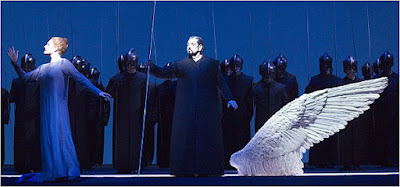 Lohengrin (at left, from a nineteenth century postcard) first appears in the written record as "Loherangrin," the son of Parzival, the Grail King, in the epic Parzival of Wolfram von Eschenbach (1170-1220). The Knight of the Swan story was part of a long oral tradition associated with Godfrey of Bouillon, but von Eschenbach was the first to tie the tale to the Arthurian legend of the Holy Grail. In this version of the story, Loherangrin serves his father as one of the Grail Knights, who are sent out in secret to guard kingdoms that have lost their protectors. Loherangrin is eventually called to this duty in Brabant, where the duke has died without a male heir. The duke's daughter Elsa fears the kingdom will be lost, but Loherangrin arrives in a boat pulled by a swan and offers to defend her, though he warns that she must never ask his name. They fall in love and eventually wed, but one day Elsa asks what she knows is verboten. The Swan Knight answers, but then regretfully steps back onto his boat, never to return.
Lohengrin (at left, from a nineteenth century postcard) first appears in the written record as "Loherangrin," the son of Parzival, the Grail King, in the epic Parzival of Wolfram von Eschenbach (1170-1220). The Knight of the Swan story was part of a long oral tradition associated with Godfrey of Bouillon, but von Eschenbach was the first to tie the tale to the Arthurian legend of the Holy Grail. In this version of the story, Loherangrin serves his father as one of the Grail Knights, who are sent out in secret to guard kingdoms that have lost their protectors. Loherangrin is eventually called to this duty in Brabant, where the duke has died without a male heir. The duke's daughter Elsa fears the kingdom will be lost, but Loherangrin arrives in a boat pulled by a swan and offers to defend her, though he warns that she must never ask his name. They fall in love and eventually wed, but one day Elsa asks what she knows is verboten. The Swan Knight answers, but then regretfully steps back onto his boat, never to return.In 1848 Richard Wagner adapted the tale into his wildly popular opera Lohengrin,the work through which the story is best (perhaps solely) known today. In the opera, Lohengrin appears on his favorite mode of transport to defend Princess Elsa from the false accusation of killing her brother (who turns out to be alive and well at the end of the opera). Intriguingly, Wagner extends the theme of the Holy Grail, and its symbolism of masculine purity, further into the story by adding an explanation for Lohengrin's keeping his true identity in the closet: the Grail, recovered by Lohengrin's father, imbues the Knight of the Swan with mystical powers that can only be maintained if their source remains unspoken. The most famous piece from Lohengrin is the "Bridal Chorus" (now familiar as "Here Comes the Bride"), which accompanies the marriage of Lohengrin and Elsa; one of the shorter Wagnerian works, the opera remains a staple of the modern stage.

Robert Wilson's recent production of Lohengrin for the Metropolitan Opera.


No comments:
Post a Comment